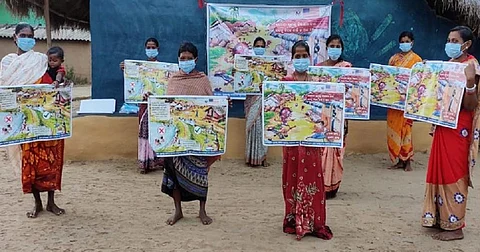Building resilience amid COVID-19: Odisha’s tribal youth show the way
As India grapples with unprecedented challenges posed by the second wave of the novel coronavirus disease (COVID-19), in Odisha, tribal youths, are demonstrating their continued leadership, with the support of civil society organisations and international agencies.
“The COVID-19 pandemic reveals the existing inequalities in our society,” Debendra Kumar Swain, project officer, United Nations Development Programme, Bhubaneswar, said. “It is high time the most vulnerable like the Adivasi and forest dwelling communities are protected.”
Several studies have revealed that a lack of information, poor nutritional facilities, inadequate healthcare infrastructure, restricted movements to forest areas and the increasing rate of forest fires are some of the factors responsible for the worsening economic conditions across the tribal hinterlands in India.
To alleviate the situation, the Kalinga Institute of Social Sciences, in collaboration with the US Consulate General Hyderabad, has launched an awareness and resilience-building programme. It aims at capacity building of tribal youths and local civil society organisations in Rayagada, Nabarangpur, Koraput, Malkangiri and Kandhamal districts of Odisha.
Across these five districts, 100 youth volunteers belonging to Scheduled Tribes have been identified and trained under the initiative. To become a volunteer, one should be within the age group of 22-35 years. The volunteer should belong to a Scheduled Tribe and be fluent in local dialects, with a passion for community development.
These youth volunteers have been playing a leading role in sensitising tribal communities to properly abide by the rules and guidelines issued by the state government to deal with the pandemic-induced crisis.
The project has supported frontline government health workers at the local, block and district level by informing 100 indigenous youth volunteers on varied aspects of Covid-19, .
“In tribal areas, one of the biggest challenges is the information gap,” said Ronit Sabar, district coordinator, KISS, Rayagada. “To counter this, we have created posters, leaflets and animated videos in local dialects busting myths about the novel coronavirus.” These outreach materials have been distributed across 600 tribal villages with 10,804 people spanning across the five districts.
“This awareness-building programme is influencing local communities to engage in helpful behavioural changes,” Hara Prasad Hepruka, youth leader and the sarpanch of Kuli panchayat in Bissamcuttack block of Rayagada, said.
“Tribal youth volunteers have been spreading public health information in engaging ways such as animated videos. This is promoting effective handwashing and adhering to proper social distancing at the community level,” Hepruka added.
“Initially, villagers used to say that the virus cannot infect Adivasi people,” Reena Nachika, youth volunteer from Narayanpatna block of Koraput district, said. “But with persistence, mobilisation and spreading information through interactive ways, villagers have now started practicing proper sanitation measures.”
Commenting on the initiative, Suraj Roy, deputy director, KISS, Bhubaneswar said: “Young people are catalysts for a better tomorrow. We need to recognise their abilities and wisdom and nurture their skill. Amid the pandemic, they should play a meaningful part on the way forward.”
“From a long-term perspective, we need to strengthen food and nutritional security of tribal people,” Manas Mohanty, district coordinator, KISS, Koraput, said. “A robust and comprehensive social protection mechanism will minimise the socio-economic impact of the pandemic.”
“The battle is far from over,” said Urmila Lenka who works as a project coordinator with a Nabarangpur-based non-profit called Sahara. “Several challenges have been reported in administering vaccinations in rural areas. Some people are reluctant to be vaccinated while others claim that they need to travel long distances to reach a health centre.”
Only 44 per cent people in rural areas are willing to pay for the COVID-19 vaccine, a nationwide survey conducted in December 2020 by news website Gaon Connection showed. It was conducted in 60 districts across 16 states and one Union territory, covering 6,040 households. Almost 36 per cent people said they won’t pay for the vaccine.
“This is a pressing challenge,” Sibashish Balabant, district coordinator, KISS, Nabarangpur, said. “Our youth volunteers are already on ground zero. They are sensitising communities about the importance of the vaccine in the fight against COVID-19.”
“I was not very sure about taking the vaccine,” Rajmahan Bhatra, 48, Kutuguda village in Badakumari panchayat of Umerkot block under Nabarangpur district, said. “But youth volunteers visited our village and motivated people to take the vaccine. On April 5, I took the first shot. Now, my friends are also interested in getting inoculated.”
Views expressed are the author’s own and don’t necessarily reflect those of Down To Earth

